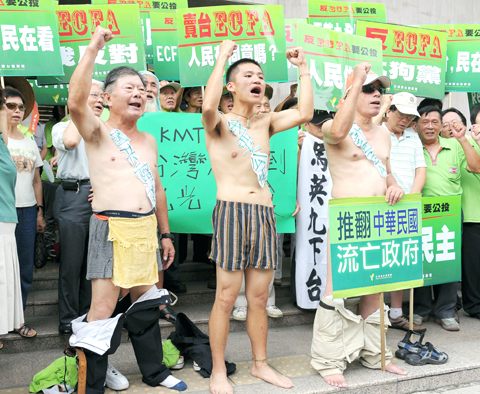The legislature yesterday ratified the cross-strait Economic Cooperation Framework Agreement (ECFA) after a showdown that saw all the Democratic Progressive Party (DPP) caucus’ motions voted down by the Chinese Nationalist Party (KMT) majority.
The vote took place after more than 10 hours of clause-by-clause deliberation, with KMT and DPP lawmakers taking the floor in turn to speak for and against the ECFA.
Yesterday was the first day of the second provisional session of the summer recess initiated by the KMT caucus to have the legislature ratify the ECFA that Taiwan signed with China on June 29.

PHOTO: CNA
Describing the ECFA as the “most important treaty” Taiwan had signed since World War II in terms of its negative impact on the nation’s sovereignty, DPP caucus whip Ker Chien-ming (柯建銘) said his caucus had done its best to warn against the agreement.
“The ECFA was a product of the KMT cooperating with the Chinese Communist Party in bringing Taiwan under the control of China economically, moving toward eventual unification,” Ker said.
The vote proceeded smoothly after the KMT caucus and President Ma Ying-jeou’s (馬英九) administration, initially having insisted on a single vote for the entire ECFA as a package, on Monday agreed to allow motions for revision of the ECFA on an individual basis.
The vote started at 9:20pm. Holding just 33 seats in the 112-seat legislature, the DPP failed in each of its 18 motions.
DPP lawmakers then shouted anti-ECFA slogans, saying the agreement was signed under the “one China” principle.
The KMT caucus, meanwhile, proceeded with its motion to vote for the accord as a whole package.
KMT Legislator Lai Shyh-bao (賴士葆) hailed the passage of the ECFA, saying its implementation would ensure the country’s economic prosperity for 50 or 60 years.
KMT Legislator Lu Shiow-yen (盧秀燕) said “China downgraded itself” to sign the accord in the name of the Association for Relations Across the Taiwan Strait, rather than its official name, in order to help boost Taiwan’s economy.
Upset with the decision, pro-independence advocates gathered outside the legislature cried foul and said the agreement would subject Taiwan to growing Chinese interference.
Holding placards and chanting anti-government slogans, around 50 activists had gathered outside the legislature hours before the vote, saying the review was flawed.
Leading the group, National Taiwan University professor Tsay Ting-kuei (蔡丁貴) said the ECFA would “strip Taiwanese people of everything and was an abuse of the people’s rights.”
To prove his point, he stripped off, along with four other activists.
Other activists climbed onto the legislature’s main gate, shouting the ECFA would leave Taiwan with no future and that it should be put to a referendum. Some painted themselves with green paint, saying that the agreement “raped Taiwan.
Although protestors verbally clashed with police at one point in the evening, no scuffles broke out between the group and police.

PREPAREDNESS: Given the difficulty of importing ammunition during wartime, the Ministry of National Defense said it would prioritize ‘coproduction’ partnerships A newly formed unit of the Marine Corps tasked with land-based security operations has recently replaced its aging, domestically produced rifles with more advanced, US-made M4A1 rifles, a source said yesterday. The unnamed source familiar with the matter said the First Security Battalion of the Marine Corps’ Air Defense and Base Guard Group has replaced its older T65K2 rifles, which have been in service since the late 1980s, with the newly received M4A1s. The source did not say exactly when the upgrade took place or how many M4A1s were issued to the battalion. The confirmation came after Chinese-language media reported

The Taiwanese passport ranked 33rd in a global listing of passports by convenience this month, rising three places from last month’s ranking, but matching its position in January last year. The Henley Passport Index, an international ranking of passports by the number of designations its holder can travel to without a visa, showed that the Taiwan passport enables holders to travel to 139 countries and territories without a visa. Singapore’s passport was ranked the most powerful with visa-free access to 192 destinations out of 227, according to the index published on Tuesday by UK-based migration investment consultancy firm Henley and Partners. Japan’s and

A Ministry of Foreign Affairs official yesterday said that a delegation that visited China for an APEC meeting did not receive any kind of treatment that downgraded Taiwan’s sovereignty. Department of International Organizations Director-General Jonathan Sun (孫儉元) said that he and a group of ministry officials visited Shenzhen, China, to attend the APEC Informal Senior Officials’ Meeting last month. The trip went “smoothly and safely” for all Taiwanese delegates, as the Chinese side arranged the trip in accordance with long-standing practices, Sun said at the ministry’s weekly briefing. The Taiwanese group did not encounter any political suppression, he said. Sun made the remarks when

BROAD AGREEMENT: The two are nearing a trade deal to reduce Taiwan’s tariff to 15% and a commitment for TSMC to build five more fabs, a ‘New York Times’ report said Taiwan and the US have reached a broad consensus on a trade deal, the Executive Yuan’s Office of Trade Negotiations said yesterday, after a report said that Washington is set to reduce Taiwan’s tariff rate to 15 percent. The New York Times on Monday reported that the two nations are nearing a trade deal to reduce Taiwan’s tariff rate to 15 percent and commit Taiwan Semiconductor Manufacturing Co (TSMC, 台積電) to building at least five more facilities in the US. “The agreement, which has been under negotiation for months, is being legally scrubbed and could be announced this month,” the paper said,